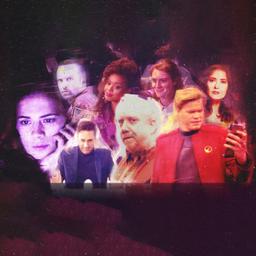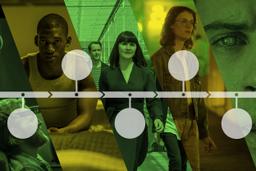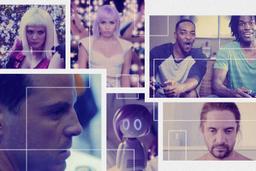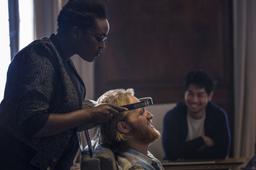In January of 1963, The Twilight Zone made its triumphant return to television. One year earlier, CBS executive James T. Aubrey had abruptly canceled the genre-defining anthology, but after the program he chose to replace it with (a sitcom called Fair Exchange about two World War II veterans and their teenage daughters) failed to find an audience, The Twilight Zone was restored to the airwaves in its original format, with one big difference.
Each episode had ballooned from 30 minutes to an hour. For series creator Rod Serling, who wrote 92 out of 156 total episodes in The Twilight Zone’s original run, this quickly became an impossible challenge. “I was writing so much, I felt I had begun to lose my perspective on what was good and what was bad,” he later said. The network continued to meddle, but Serling was too tired to fight back. By January 1964, CBS canceled The Twilight Zone for good (at least until its first major revival two decades later).
If The Twilight Zone has a modern equivalent, it’s undeniably Black Mirror, the brainchild of another singular creative talent in Charlie Brooker, who’s written or cowritten every episode of the disturbingly dark sci-fi drama except for one. (Season 1’s soul-crushing “The Entire History of You” is the work of Succession creator Jesse Armstrong.) Both anthologies hinge on evocative what-if concepts, social commentary, and dark twists, though Black Mirror homes in on a modern tech obsession that Serling never could have imagined.
Much like The Twilight Zone, Black Mirror had a stumble of its own when the show lost the support of the U.K.’s Channel 4 and landed on Netflix in 2016. All of a sudden, its tidy three-episode seasons swelled to six episodes, and our understanding of what defines a Black Mirror episode was obscured. The old answer—British actors telling depressing stories about near-future technology—gave way to everything from Hollywood A-listers like Anthony Mackie and Miley Cyrus to happy love stories like “San Junipero” and “Hang the DJ” to a pivot into pure horror under a new “Red Mirror” sub-brand.
“I was aware we’re going on a global platform now,” Brooker told a crowd at SXSW in 2023. “So we’ve got to make these stories a bit more international, and I wanted to mix it up a bit, as in not just keep doing bleak-a-thons.”
But even Netflix’s global platform has its limits, and the show’s foray into horror in Season 6 landed particularly poorly, suggesting that while Black Mirror fans will tolerate a lot, the one thing they won’t accept is a shift away from science fiction entirely. Clearly, Brooker was listening. The seventh season, which is streaming now, offers six straight episodes of dystopian sci-fi drama. This includes the show’s first sequel (a follow-up to Season 4’s “USS Callister”), a couple of what one might call “classic” Black Mirror episodes, and two more that seemingly exist to skewer Netflix itself.
Even as Black Mirror attempts to course correct, it’s impossible to deny that the show no longer has one defining style. Seven seasons (plus one Christmas special and one interactive experiment) later, Black Mirror is a series at war with itself—and apparently with Netflix. That’s not necessarily a bad thing. After all, some of the best episodes in recent memory have broken from the original dystopian formula that made the series a hit. But it does raise some serious questions about how long Brooker can keep this up before he goes the way of Serling and admits defeat.
Black Mirror’s very first episode (the one where Britain’s prime minister has sex with a pig on live television) will always feel like an outlier, largely because it takes place in modern times with no sci-fi elements. But the show’s second episode, “Fifteen Million Merits,” is the platonic ideal of a Black Mirror story.
The stationary-bike episode, as you might know it, drops us into a dystopia where humans are forced to ride Peloton-style bikes in exchange for digital currency and live in jail cells covered in screens. It’s a world full of familiar technology used in horrifying new ways. By the end, it’s clear humanity has built a cage for itself that cannot be escaped, a recurring theme throughout other early Black Mirror episodes like “The Entire History of You” (what if you had a chip in your brain that recorded everything you saw?) and “The Waldo Moment” (what if the government could control humanity with a populist CGI bear?). Later seasons continued to pull this thread with disturbing entries like “Men Against Fire” and “Arkangel,” which both explore the brain-chip concept introduced in “The Entire History of You” while applying it to warfare and parenting, respectively (neither goes well).
Black Mirror’s seventh season offers two more episodes that fall into this category, with mixed results. The first is “Bête Noire,” about a food scientist who’s tormented by a former classmate she bullied in high school. Her torture takes the form of a bizarre twist on the Mandela effect: Facts she knows to be indisputably true (like the name of a popular chicken shop chain) suddenly change, and nobody else realizes. The story culminates in a sci-fi twist that’s equal parts brilliant and absurd—if somewhat dissatisfying.
Deeper into the season, we get “Plaything,” in which an eccentric journalist played by Doctor Who star Peter Capaldi becomes entranced by a Sims-like video game, which may or may not usher in the AI singularity. “Plaything” is one of the best episodes of Season 7 thanks to some shockingly dark twists and an unnerving cliff-hanger. In other words, it’s classic Black Mirror.
Based on Season 7, it sure seems like Brooker and Black Mirror could keep pumping out dystopian melodramas forever (or at least for a few more seasons). There’s clearly no lack of inspiration for new ideas. But the rest of this batch reveals just how far Brooker is willing to go to mix things up.
To quote a classic R.E.M. song, under Netflix’s ownership, Black Mirror was suddenly full of shiny, happy people holding hands. That’s a bit of an overstatement, but for every bleak new story, we seemingly got two more where recognizable American actors learned a valuable lesson about the dangers of technology.
Some of those episodes are great. Take “Nosedive,” in which a try-hard social climber (Bryce Dallas Howard) watches her life rapidly unravel after she gets a bad review in her world’s ruthless social credit system. Or the aforementioned “USS Callister,” where a creepy video game CTO (Jesse Plemons) traps digital copies of his employees (including Cristin Milioti) inside his own game. Or “San Junipero,” one of the most touching television love stories of the 21st century. Then again, there’s also “Rachel, Jack and Ashley Too,” a.k.a. that extremely forgettable Miley Cyrus episode.
Season 7 offers two more shiny, happy entries, including the highly anticipated sequel, “USS Callister: Into Infinity,” which, unfortunately, is a bit of a disappointment. While the intriguing premise of the original provided enough momentum to propel us through its story, the sequel feels more like a generic Star Trek spinoff than a Black Mirror episode. “Into Infinity” does elicit a few good gasps by the end of its movie-length running time, but it’s not enough to validate the show’s first sequel.
Meanwhile, “Eulogy” is a clear standout thanks to its Hollywood star: Paul Giamatti. The episode introduces Giamatti as a bitter shut-in asked to revisit his memories of an old romance. The sci-fi twist here is a VR device that can scan physical photos and then transport you into a 3D re-creation of the image. Using this simple concept, Black Mirror explores themes of love, heartbreak, and selective memory, all in a tidy package with an uplifting ending.
If episodes like “Eulogy” are the future of Black Mirror, then the show has a clear path forward, but there’s another recent trend that could signal problems on the horizon.
In 2023, Black Mirror’s sixth season opened with a bang. “Joan Is Awful” follows a stereotypical millennial named Joan (Annie Murphy) whose life suddenly becomes the plot of a hit new show, also called Joan Is Awful, starring Salma Hayek. Joan soon learns that the user agreement she signed with the streaming service Streamberry (which looks exactly like Netflix and even features that same “tudum” startup sound) gives the service the right to listen in on her life via her smartphone and reveal her embarrassing secrets in bingeable, hour-long installments.
As Joan’s life quickly falls apart (she loses her job for revealing company secrets in an episode of the streaming show), one thing becomes clear: Streamberry is evil. At one point, its CEO reveals the company green-lit Joan Is Awful because happy stories don’t perform as well on the service.
Speaking to Deadline in 2024, Brooker claimed his Netflix satire was mostly a coincidence. Streamberry started out as a generic streaming service but slowly morphed into its final form during production. “It slightly happened in a stealthy way,” he said, adding: “Netflix was good sports about it.”
Fair enough. No harm, no foul. And we’d believe Brooker … if it weren’t for Season 7. The latest batch of episodes features not one but two vicious bites at the hand that feeds Black Mirror, with unique gripes about Netflix and the streaming era in general.
First up is “Common People,” this season’s opener, in which Rashida Jones plays a teacher who undergoes an experimental, lifesaving brain surgery called Rivermind. The technology that keeps her alive relies on constant access to a digital network—which comes with a $300 monthly subscription fee. Before too long, Rivermind is pressuring its customers to upgrade to a pricy “premium” package while it quietly introduces ads to the “standard” tier. Anyone who’s watched their Netflix bill double over the years will instantly feel triggered, and the episode only gets darker from there, leading to one of the bleakest endings in Black Mirror history.
Finally, we have “Hotel Reverie,” in which a tech startup partners with a crumbling movie studio to remake one of its classics. The studio hires a rising Hollywood star, played by Issa Rae, to step into a virtual re-creation of the film and take over the leading role, as if she were in the original film herself, while AI versions of the original supporting cast perform their parts around her. It’s the kind of cost-saving technology real-life movie studio heads would probably drool over. As Rae’s character reenacts the movie, we watch the “director” carefully study a screen full of data tracking metrics like romance and suspense. “Exposition deployed,” one assistant says with a smile after an early scene is recorded. What are the odds Brooker’s heard something similar uttered at Netflix HQ?
Whether Black Mirror will continue to bash Netflix in future seasons remains to be seen. For now, the streamer seems to be one of the primary targets fueling the show and providing new ideas. But like Rod Serling before him, Charlie Brooker may eventually become too weary to punch back.
The future of Black Mirror has never been less clear. What began as a dystopian take on The Twilight Zone has expanded into a mini media empire with no fixed identity. Each new idea spawned from Brooker’s twisted mind feels more like a rebuke of the ones that came before than the next step toward some grand worldview. Then again, Black Mirror never promised to predict the future or even explain our modern world—although that’s what its earliest episodes often felt like—but in its current, contradictory incarnation, it’s difficult to say what this show is even about anymore, let alone where it’s headed.
Then again, as long as we keep getting great episodes like “Common People,” “Eulogy,” and “Plaything,” we should all be willing to accept a bit of uncertainty—and even the occasional big swing that fails to connect—in service of whatever dystopian horrors Brooker cooks up next.



